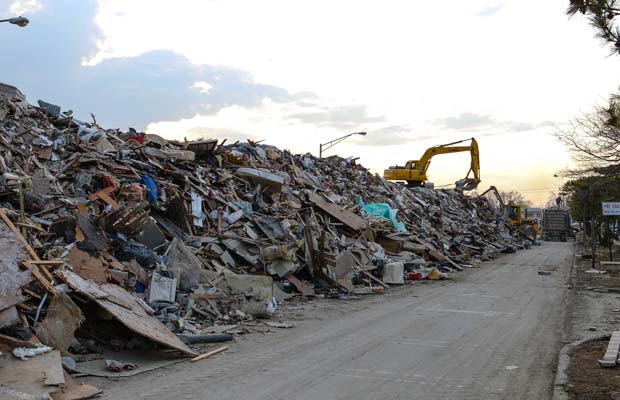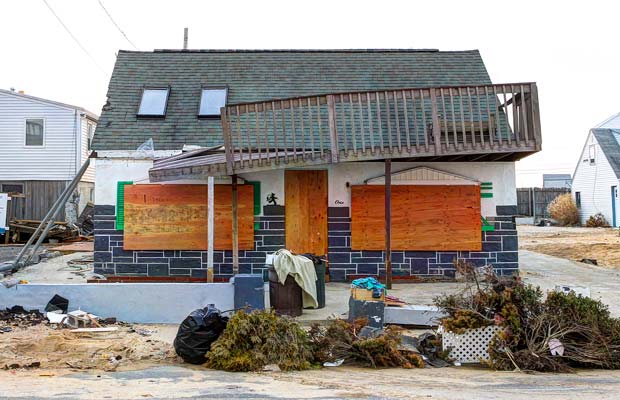Then all hell broke loose 
The weeks after the storm featured large mounds and blocks of bulldozed rubble. The eye of Sandy reminded some of Katrina, Afghanistan and war zones. Homes were flooded with water and dead fish, covered with sand and shells. "It was a nightmare that came true," said one player.
Photo by Vincent Carchietta
When the players returned to the fieldhouse following the victory over Keyport that tied the school single-season record for wins, second-year head coach John Wagner told them to put their cleats at the top of their lockers.
"I thought maybe the water might sneak in or something could go wrong, not knowing what was really going to happen,'' Wagner said.
As the menacing and massive green blob on the radar moved closer to the Jersey Shore and New Jersey Governor Chris Christie urged residents in coastal areas to evacuate, the Point Pleasant Beach players were a mixture of apprehension and skepticism.
In addition to the town of Point Pleasant Beach, the high school also includes students from the beach towns of Lavallette, Bayhead and Mantoloking.
"We had Hurricane Irene over the summer and that didn't do much, so I didn't think this would be much worse,'' Morris said. "Then all hell broke loose.''
Kusma, who lives only five houses from the beach in the coastal town of Lavallette, evacuated to a relative's home in Philadelphia, which his family had done customarily in previous hurricanes. Senior running back
Andre Cochran and his family left their home one block from the beach and stayed in neighboring Point Pleasant Borough with his older brother.

Junior offensive lineman Tom D'Amore
Photo by Vincent Carchietta
Wagner sent his wife to stay with friends up in northern New Jersey and remained in his home in nearby Manasquan. In a tradition established during previous hurricanes, senior running back
Danny Tighe went to stay with Morris out of superstition.
D'Amore and his family planned to ride out the storm, even if it meant having to migrate to the second floor because of potential flooding.
The outer bands of Hurricane Sandy arrived on Sunday afternoon, barely 24 hours after the win over Keyport. They brought rain and heavy winds, but were a pale imitation of what was about to hit land in full force with a tidal surge of historic proportions.
At 5 a.m. on Monday, D'Amore and his sister were startled awake by their parents. The family had to leave immediately. The water was rising at a rate no one had ever seen, and high tide had yet to arrive.
"It was just surreal,'' D'Amore said.
At Point Pleasant Beach Fire Company No. 2, the frantic calls from residents started Sunday night and didn't stop for days. By Monday, the firehouse itself was flooded.
"It was deeper water than I've ever seen before in the town, and I have lived here all 46 years of my life,'' said Lt. Michael Brodeur, a 30-year veteran of the fire company and the technology coordinator at the high school.
Houses were battered by waves and a relentless wall of water, telephone poles fell like trees in a forest and sparking power lines crackled in winds that reached 90 mph. The New Jersey Transit railroad tracks that parallel Route 35 became the dividing line of civilization. West of the tracks was the 21st Century and minor damages. East of the tracks toward the beach, which includes Point Pleasant Beach's football field, was an underwater nightmare plunged into apocalyptic chaos.
"You couldn't do much east of the tracks until late Tuesday afternoon,'' Brodeur said. "It was a shock what was going on. We had an Army 6-by-6 truck, and we still couldn't get through the water.''
When Sandy finally let the Jersey Shore out of its merciless grip late Monday night, an eerie silence filled the darkness in the town before the sirens began blaring. Tighe, who was unable to reach his family for two days because there was no cell phone service, ventured to the beach in nearby Bayhead at 6 a.m. Tuesday with Morris to get a first-hand glimpse.
"It looked like nothing I had ever seen before,'' Tighe said.
"You couldn't imagine what we saw,'' Morris said. "There were kitchen floors in the middle of the highway, piles of sand, houses jolted with electricity and wires hanging everywhere. It was just devastating. I knew one of the policemen who was there, and he said, ‘I don't even know where we're going to start.'"

Officials estimate restoration of the town's boardwalk
area will cost more than $2 million. The hope is that the
work will be completed by summer.
Photo by Vincent Carchietta
Far from home, Kusma feared the worst as he scoured the Internet for reports of what had become of his town. He wouldn't be able to return to his home for nearly two weeks because it was deemed unsafe by authorities.
"I saw pictures and reports of crazy things happening all over the island where I live, and fires setting houses aflame,'' Kusma said. "I was expecting to wake up in the morning and have someone call and say our house wasn't there anymore.''
Cochran and his father knew a local police officer who allowed them to visit their home on Tuesday morning. The entire first floor was flooded with 4 feet of water, and the ground was covered in sand, shells and dead fish.
"It was a nightmare that came true,'' Cochran said.
It's one thing to see images of devastation on television, and entirely another to see them where your living room used to be.
"I went down to Louisiana a couple years ago with the church, so I knew what it was like down there (after Hurricane Katrina),'' D'Amore said. "I never could've imagined it could've happened to me.''
"It was unbelievable,'' Kusma said. "It was a disaster zone from the tip of the island over to my house in Lavallette. (It was) stuff that I had never seen before, only on TV when you looked at Katrina or a war-torn country.''
The spot where a home belonging to Morris' stepfamily in nearby Mantoloking previously stood was now a newly formed inlet of the river. Three feet of water covered Point Pleasant Beach's football field. The National Guard was out in force on the streets, wielding assault rifles and blocking entrances to ravaged areas with Humvees while keeping an eye out for looters. Brodeur and his fellow firemen were going door-to-door to check if anyone was trapped in their home and turning off gas meters to prevent potential explosions and fires.
"My older brother Pat was in the Marines for five years,'' Morris said. "He said, ‘I've seen the worst four corners of the world. I've blown up houses in Afghanistan before, and I've never seen devastation like this.'
"The sirens that were cheering us after (beating) Keyport were now for houses on fire and gas leaking everywhere.''

Broken and tattered homes stood throughout the community, but spirits — aided largely by the football team — began to rebuild.
Photo by Vincent Carchietta